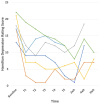Accelerated transcranial magnetic stimulation for psychological distress in advanced cancer: A phase 2a feasibility and preliminary efficacy clinical trial
- PMID: 38482823
- PMCID: PMC11025297
- DOI: 10.1177/02692163241234799
Accelerated transcranial magnetic stimulation for psychological distress in advanced cancer: A phase 2a feasibility and preliminary efficacy clinical trial
Abstract
Background: Psychological and existential suffering affects many people with advanced illness, and current therapeutic options have limited effectiveness. Repetitive transcranial magnetic stimulation (rTMS) is a safe and effective therapy for refractory depression, but no previous study has used rTMS to treat psychological or existential distress in the palliative setting.
Aim: To determine whether a 5-day course of "accelerated" rTMS is feasible and can improve psychological and/or existential distress in a palliative care setting.
Design: Open-label, single arm, feasibility, and preliminary efficacy study of intermittent theta-burst stimulation to the left dorsolateral prefrontal cortex, 600 pulses/session, 8 sessions/day (once per hour) for 5 days. The outcomes were the rates of recruitment, completion of intervention, and follow-up (Feasibility); and the proportion of participants achieving 50% improvement on the Hamilton Depression Rating Scale (HDRS) or Hospital Anxiety and Depression Scale (HADS) 2 weeks post-treatment (Preliminary Efficacy).
Setting/participants: Adults admitted to our academic Palliative Care Unit with advanced illness, life expectancy >1 month and psychological distress.
Results: Due to COVID-19 pandemic-related interruptions, a total of nine participants were enrolled between August 2021 and April 2023. Two withdrew before starting rTMS, one stopped due to clinical deterioration unrelated to rTMS, and six completed the rTMS treatment. Five of six participants had a >50% improvement in HDRS, HADS-Anxiety, or both between baseline and the 2 week follow up; the sixth died prior to the 2-week follow-up. In this small sample, mean depression scores decreased from baseline to 2 weeks post-treatment (HDRS 18 vs 7, p = 0.03). Side effects of rTMS included transient mild scalp discomfort.
Conclusions: Accelerated rTMS improved symptoms of depression, anxiety, or both in this small feasibility and preliminary efficacy study. A larger, sham-controlled study is warranted to determine whether rTMS could be an effective, acceptable, and scalable treatment in the palliative setting.
Trial registration: NCT04257227.
Keywords: Transcranial magnetic stimulation; anxiety; depression; end of life care; existential distress; palliative care.
Conflict of interest statement
Declaration of conflicting interestsThe author(s) declared the following potential conflicts of interest with respect to the research, authorship, and/or publication of this article: JD and JD have a financial interest in Ampa, Inc., a company that manufactures rTMS devices. The other authors have no conflicts of interest to declare.
Figures
Similar articles
-
Randomised controlled feasibility trial of real versus sham repetitive transcranial magnetic stimulation treatment in adults with severe and enduring anorexia nervosa: the TIARA study.BMJ Open. 2018 Jul 16;8(7):e021531. doi: 10.1136/bmjopen-2018-021531. BMJ Open. 2018. PMID: 30012789 Free PMC article. Clinical Trial.
-
A two-site pilot randomized 3 day trial of high dose left prefrontal repetitive transcranial magnetic stimulation (rTMS) for suicidal inpatients.Brain Stimul. 2014 May-Jun;7(3):421-31. doi: 10.1016/j.brs.2014.03.006. Epub 2014 Mar 19. Brain Stimul. 2014. PMID: 24731434 Clinical Trial.
-
Repetitive transcranial magnetic stimulation for the treatment of major depressive disorder: an evidence-based analysis.Ont Health Technol Assess Ser. 2004;4(7):1-98. Epub 2004 Jun 1. Ont Health Technol Assess Ser. 2004. PMID: 23074457 Free PMC article.
-
[Efficacy of repetitive transcranial magnetic stimulation (rTMS) in major depression: a review].Encephale. 2007 Mar-Apr;33(2):126-34. doi: 10.1016/s0013-7006(07)91542-0. Encephale. 2007. PMID: 17675907 Review. French.
-
A transdiagnostic review of safety, efficacy, and parameter space in accelerated transcranial magnetic stimulation.J Psychiatr Res. 2022 Aug;152:384-396. doi: 10.1016/j.jpsychires.2022.06.038. Epub 2022 Jun 28. J Psychiatr Res. 2022. PMID: 35816982 Free PMC article. Review.
Cited by
-
Cancer neuroscience in head and neck: interactions, modulation, and therapeutic strategies.Mol Cancer. 2025 Mar 31;24(1):101. doi: 10.1186/s12943-025-02299-6. Mol Cancer. 2025. PMID: 40165230 Free PMC article. Review.
-
Mechanisms of Action of TMS in the Treatment of Depression.Curr Top Behav Neurosci. 2024;66:233-277. doi: 10.1007/7854_2024_483. Curr Top Behav Neurosci. 2024. PMID: 38844713 Review.
-
Repetitive Transcranial Magnetic Stimulation: Is it an Effective Treatment for Cancer Pain?Pain Ther. 2025 Feb;14(1):47-66. doi: 10.1007/s40122-024-00679-2. Epub 2024 Nov 17. Pain Ther. 2025. PMID: 39551863 Free PMC article. Review.
References
-
- Kelly B, McClement S, Chochinov HM. Measurement of psychological distress in palliative care. Palliat Med 2006; 20: 779–789. - PubMed
-
- Lo C, Panday T, Zeppieri J, et al.. Preliminary psychometrics of the Existential Distress Scale in patients with advanced cancer. Eur J Cancer Care (Engl) 2017; 26(6). - PubMed
-
- Arrieta O, Angulo LP, Nunez-Valencia C, et al.. Association of depression and anxiety on quality of life, treatment adherence, and prognosis in patients with advanced non-small cell lung cancer. Ann Surg Oncol 2013; 20: 1941–1948. - PubMed
Publication types
MeSH terms
Associated data
LinkOut - more resources
Full Text Sources
Medical
Miscellaneous


